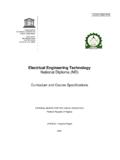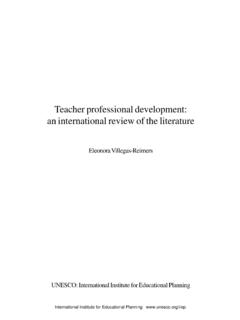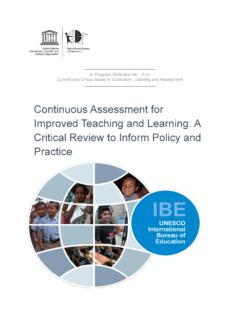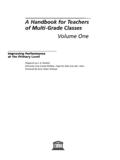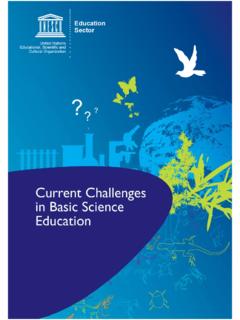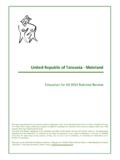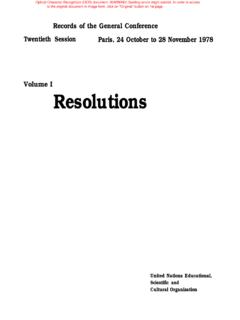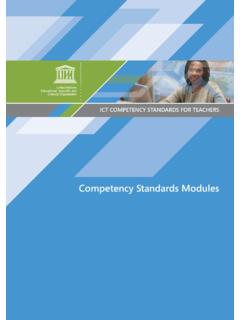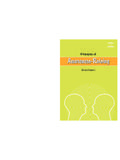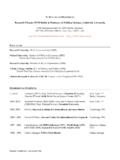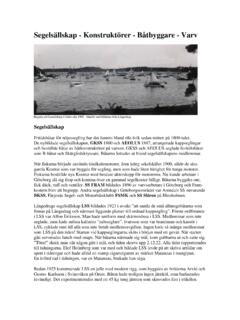Transcription of Apartheid: its effects on education, science, culture …
1 Apart// /V/its effects oneducationsciencecultureand informationunescoApartheidApartheidIts effects oneducation, science, culture and informationunescoPublished in 1967 by the United Nations ;Educational, Scientific and Cultural OrganizationPlace de Fontenoy, Paris-?6 Printed by Imprimeries Re"unies de Chambery , Unesoo 1967 Printed in FranceSHC. SS. 67 :PrefaceThe racial policies of the Government of the Union, now the Republicof South Africa have been before the United Nations since the firstsession of the General Assembly in 1946. India, in that year, broughtbefore the Assembly a complaint that the Government of South Africahad enacted legislation which discriminated against South Africans ofIndian origin.
2 Since then the racial policies of the Government ofSouth Africa have been under consideration by both the GeneralAssembly and the Security Council. Resolutions passed by the GeneralAssembly reflect the mounting concern of world opinion about theracial situation within South Africa and the frustration occasionedby the refusal of the government to respond to the repeated appealsby the United Nations that its racial policies should be brought intoconformity with the United Nations Charter. Resolution 395 (V) ofthe General Assembly, 2 December 1950, states that 'a policy of"racial segregation" ( apartheid ) is necessarily based on doctrines ofracial discrimination'.
3 In 1954, the Assembly'invited' the Governmentof South Africa to reconsider its position in the light of the principlesof the Charter. In 1955, the Assembly 'expressed its concern' aboutthe policies of the South African Government. In 1957, it 'appealed'to the government to revise its policy and Resolution 1375 (XIV),17 November 1959, reminded it that 'government policies whichaccentuate or seek to preserve racial discrimination are prejudicialto international harmony', noted 'with concern that the policy ofapartheid is still being pursued' and 'expressed its opposition to thecontinuance or preservation of racial discrimination in any part of theworld.
4 '.In August 1963, the Security Council recommended that the saleand shipment of all arms, ammunition and military vehicles to SouthAfrica should stop. This followed a more comprehensive resolution,1761 (XVH), adopted by the General Assembly in November 1962,which asked Member States to take specific measures, such as break-ing off diplomatic relations with the Government of the Republic ofSouth Africa or refraining from establishing such relations and theboycott of all South African goods. These recommendations were not,however, mandatory. At the same session, the General Assembly alsoestablished a special committee which would keep the situation inSouth Africa under review between sessions of the Assembly andwould submit reports to this Assembly and to the Security Resolution 1978 (XYIQ), 16 December 1963, the General Assem-bly 'invites the Specialized Agencies and all Member States to giveto the Special Committee their assistance and co-operation in thefulfilment of its mandate'.
5 In conformity with this resolution, theUnited Nations Special Committee on the Policies of apartheid inSouth Africa, through the Secretary-General of the United Nations,on 20 April 1965, requested Unesco 'to prepare a study on the effectsof apartheid in the fields of education , Science and culture '. Thisrequest was accepted by the Executive Board of Unesco, meeting atits 70th Session when it 'authorized' the Director-General to 'preparethe study requested of Unesco by the Special Committee on the Poli-cies of apartheid of the Government of the Republic of -1 The decision of the Executive Board was in conformitywith Unesco's responsibilities in the fields of racial discrimination asinscribed in its report on the ' effects of the Policy of apartheid in the fieldsof education , Science.
6 culture and the Dissemination of Informa-tion2 in South Africa' was therefore undertaken by the Unesco Secre-tariat for submission to the United Nations Special Committee onthe Policies of apartheid of the Government of South object is to confront the policies and practices of the Governmentof the Republic of South Africa in the fields of education , science, culture and the dissemination of information with a number of inter-national norms of conduct to which Unesco is legally and morallydedicated:1. United Nations Educational, Scientific and Cultural Organization, 70 Ex. Decisions, Paris,4 June It was considered that the report should cover all the fields of competence of the Organization, andconsequently it includes an appraisal of the effects of the policy of apartheid on the disseminationof information, as well as on education , science and Constitution of Unesco.
7 'Article 1 The purpose of the Organization is to contribute to peace andsecurity by promoting collaboration among the nations through edu-cation, science and culture in order to further universal respect forjustice, for the rule of law and for the human rights and fundamentalfreedoms which are affirmed for the peoples of the world, withoutdistinction of race, sex, language or religion.'The United Nations Charter:'Article 1 The purposes of the United Nations are:3. To achieve international in promoting and en-couraging respect for human rights and for fundamental freedomsfor all without distinction as to race, sex, language or religion.
8 'Article the United Nations shall promote:.. c. universal respect for, and observance of, human rights andfundamental freedoms for all without distinction as to race,sex, language or religion.'The Universal Declaration of Human Rights (1948):'Article 1 All human beings are born free and equal in dignity and rights.'Article 2 Everyone is entitled to all the rights and freedoms set forth in thisDeclaration, without distinction of any kind, such as race, colour,sex, language, religion, political or other opinion, national or socialorigin, property, birth or other status.'[Other articles will be quoted in the relevant chapters of this study.]
9 ]The United Nations Declaration on the Elimination of all Forms ofRacial Discrimination (1963-1965)The Unesco Convention and Recommendations against Discrimina-tion in education (1960)The Unesco Declaration of the Principle of International CulturalCo-operation (4 November 1966)Lastly, insofar as the biological aspects of race have a bearing on thequestions dealt with in this report, The proposals on the BiologicalAspects of Race, adopted in Moscow (1964) under the auspices ofUnesco, which stated:'The peoples of the world today appear to possess equal biologicalpotentialities for obtaining any civilizational level. Differences in theachievements of different peoples must be attributed solely to theircultural Neither in the field of hereditary potentialitiesconcerning the overall intelligence and the capacity for cultural deve-lopment nor in that of physical traits, is there any justification forthe concept of "inferior" and "superior" races.
10 'The sources used for the preparation of this report have been variousofficial texts (laws, regulations, parliamentary debates, etc.) of theGovernment of the Republic of South Africa, and reports from otherorganizations of the United Nations' system (The Special Committeeof the United Nations on the Policy of apartheid and the InternationalLabour Organisation). Various publications relevant to apartheid andpublished by scientific and research institutions both in South Africaand outside have also been utilized, as well as information publishedin the press, and some unpublished information emanating frompersonalities scientists and university people having a direct know-ledge of the conditions in which the policy of apartheid is applied inSouth Africa and whose competence and objectivity, in the judgementof the Secretariat, may not be one specific field that of the consequences of the policy of apart-heid on culture .
